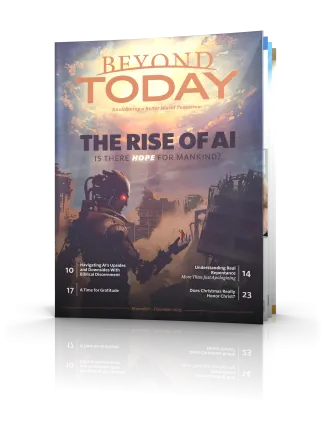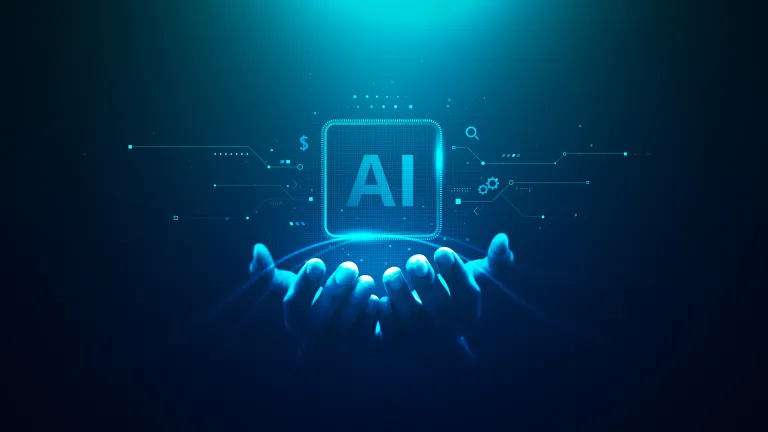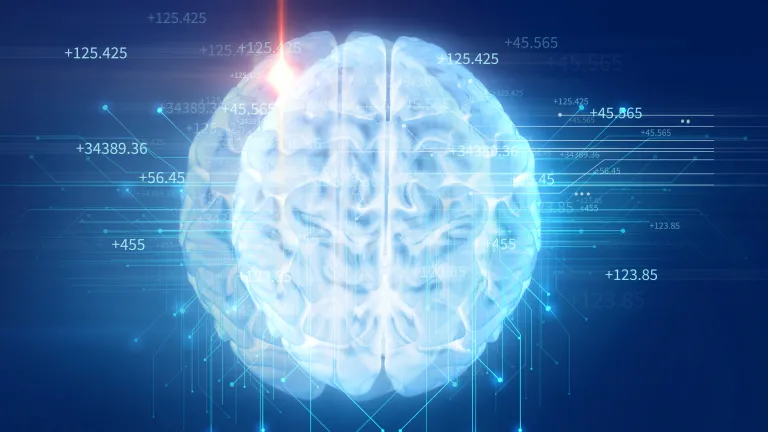Navigating AI’s Upsides and Downsides—With Biblical Discernment

To one degree or another, AI has become part of all our lives. We need to understand its pluses and minuses to properly engage with this technology.
Artificial intelligence (AI), a concept once confined to the realm of science fiction, has now become part of our everyday lives. Our homes are equipped with voice assistants like Siri and Alexa, which answer our spoken questions, control our smart devices, turn on music and set alarms. Fitness trackers like Fitbit and Apple Watch monitor our heart rates and provide us with personalized health advice. If we’ve got a letter or report to write, an AI assistant like Copilot or ChatGPT might edit our words or even do the writing for us. If we’re unhappy with a purchase and need customer support, we’ll likely communicate with the retailer’s AI-powered chatbots to try to resolve the issues.
Is this progress? Is there anything wrong with relying so much on AI? Should we be alarmed about how AI is changing our lives? Does the Bible offer any guidance in terms of how we should understand these new technologies?
Before we can answer these questions, it’s important to clarify exactly what we’re talking about. Usually when we discuss AI, we’re referring to a computer system’s ability to mimic human intelligence to perform various tasks. That’s not to say it actually thinks as a person does. Rather, it’s just sophisticated computer code running superfast.
Most AI systems in use right now are classified as narrow (or weak) AI, meaning they’re designed to perform specific tasks or a narrow range of activities, such as identifying visual images or translating foreign languages. In addition, a recently developed AI subclass known as generative AI goes beyond just processing information, focusing on creation of new content. It can produce text, images, video, audio and computer code. Very often what it generates is indistinguishable from what is human-created.
Whether AI is a “good” or “bad” development really depends on how it’s used. “Most technological advances are likely to have both an upside and a downside: A knife can be used for surgery or as a murder weapon; a car can be used to take you to work or as a getaway vehicle after a crime,” writes John Lennox in 2084: Artificial Intelligence and the Future of Humanity (Zondervan, 2020). “It is the same with AI. There are many valuable positive developments, and there are some very alarming negative aspects that demand close ethical attention” (p. 64). While those with malicious intent can certainly misuse AI for harmful purposes, AI can serve as a powerful tool for good when used responsibly.
Constructive uses
Today, nearly all industries, trades and professions are benefiting from different narrow and generative AI applications. In health care, AI technologies are being used to analyze patients’ genetic makeups and create personalized treatment plans, and to evaluate medical images like CT scans and MRIs, streamlining diagnostics. In education, generative AI tools create syllabi, lesson plans, quizzes and other course materials. Graphic designers and copywriters use AI to help brainstorm new ideas. Personnel recruiters use AI to screen resumes. Product developers use AI algorithms to find glitches early in the design stage.
And we already touched on some of the ways AI is being utilized in our personal lives. Tools like voice assistants, generative AI chatbots, email spam filters, AI task managers and digital schedulers are all designed to do some of the work we might normally have to do, particularly mundane or repetitive tasks, which can free up our time and energy for more meaningful pursuits.
For instance, we can ask Grok (an AI chatbot) a question to research, and within seconds, it’ll come up with the answer—which might have taken us considerably longer to figure out on our own. Our computers and smart keyboards now have integrated AI components that analyze our grammar and sentence structure, offer word suggestions, auto-correct spelling errors, etc. These innovations are designed to save us time and effort, making our lives easier.
Potential pitfalls
But there are still downsides—even with just the AI technology that’s already been developed and even if more advanced forms of AI don’t come to fruition. Here are some of the most serious concerns, all of which have a biblical tie-in:
1. AI doesn’t always “tell the truth.”
AI is not inherently evil or demonic, as some imagine, but it is programmed by people who are fallible and filled with wrong ideas and subject to wrong influences. Moreover, just as other media for education and entertainment have been corrupted under Satan’s rule over this world (John 14:30), so too can this tool. Some have begun placing too much trust in AI—even treating it as a sentient companion to rely on. More commonly, as pervasive as AI is becoming in our modern culture, it provides widening avenues for the dissemination of misinformation.
This can happen through its being fed and drawing from errant source material. It can also occur through what some term AI hallucinations. This refers to instances when an AI system can’t find an answer on its own, so it generates one by extrapolating from resources available. This can lead to erroneous conclusions. Yet the AI will still answer with what appears to be certainty, giving no indication it may not have all the facts.
There have been numerous times when I’ve asked AI chatbots like ChatGPT questions about religious topics and have been presented with answers I knew were wrong. Of course, if we’re asking questions relating to subjects we’re not familiar with (perhaps a complex medical or scientific matter), we may have no clue we’re being given wrong answers.
The development of generative AI has provided additional ways for people to deceive others. This new technology is being used to create deepfakes, which are AI-generated videos, images or audio clips that convincingly replicate real people’s faces or voices, and have people saying or doing things that are shocking or embarrassing. Deepfakes are typically created for lewd and obscene purposes, fraudulent advertising or to further manipulate opinion—either to damage someone’s reputation or to deliberately fool the public.
Observes Martin Ford in Rule of the Robots: “A sufficiently credible deepfake could quite literally shift the arc of history—and the means to create such fabrications might soon be in the hands of political operatives, foreign governments or even mischievous teenagers. And it’s not just politicians and celebrities who need to worry. In the age of viral videos, social media shaming and ‘cancel culture,’ virtually anyone could be targeted and possibly have both their career and life destroyed by a deepfake” (2021, p. 239).
At the very least, as deepfakes proliferate, it’s becoming harder to distinguish fiction from nonfiction, or between truth and lies.
2. Unemployment rates could escalate as jobs are increasingly filled by AI.
AI could replace many jobs primarily done by computer. That’s the majority of white-collar occupations today. Professions like research analysts, accountants, insurance underwriters, computer programmers, legal assistants, copywriters, editors and web developers—which do not require physical labor nor a lot of human interaction—are all at risk of being taken over by AI. Companies are having AI do the work people once did—to cut down on personnel expenses and to get more done (as the machines often do the work faster and at lower cost than human employees).
In recent years, numerous industry professionals have issued statements warning that AI could radically disrupt the workforce. Some have predicted that as high as 40 to 60 percent of jobs worldwide could be lost or degraded due to AI within the next three to five years.
Obviously, this would be a troubling development. Most people need a job and an income to provide for themselves and their families. Of course, workers who are able to learn new skillsets and adapt to the latest AI technologies will likely stay employed. But not everyone will be able to do that. Many people will be unemployed and idle. That’s not what God intended. He gave people work as a purposeful activity (Genesis 2:15). It’s doubtful that God would see it as an improvement for human beings to be replaced by machines.
3. AI can take away the motivation to learn and work hard.
Not only does God want us to work, He wants us to do so wholeheartedly. Ecclesiastes 9:10 says “Whatever your hand finds to do, do it with your might.” This means not doing things halfway or just to get by, but pushing ourselves to do our best—whether we’re at work or school.
With AI available to do work for us, however, it can be tempting to take the easy way out. So rather than spend hours doing the research and writing to put together an essay or a report, students and employees might have AI do the entire assignment for them.
The problem is, “we sometimes forget that the process of working through challenges is often what shapes us the most,” writes Peter Goeman in Artificial Intelligence and the Christian. “Crafting a paper requires you to digest information, understand it, articulate it, and then present it coherently. This process not only helps you retain the information but also imparts the value of the knowledge you’re acquiring. When you internalize principles and knowledge, they become integral to your character . . . Engaging with and internalizing knowledge is crucial for our growth and development. By doing so, we ensure that our abilities and understanding remain robust” (2024, pp. 41-42). When we don’t do the hard work ourselves, it can actually erode our critical thinking skills, he explains.
It’s not that we can’t use AI to assist us with our tasks. We can. I know many in the media field who use AI to gather background research, put together outlines and edit their work. But they still put together the actual project themselves. God wants us to use the minds He has given us.
4. Human connections are eroding as people communicate more with AI.
In recent years, our reliance on smartphones, social media and other forms of digital communication has led to a decrease in face-to-face human interactions. Now AI is taking it further. People are often spending more time “engaging” with AI, and less time building and maintaining real, meaningful human connections.
Today, many are drawn to websites that allow them to build synthetic relationships with AI avatars they can chat with anytime. Others put on virtual reality headsets and immerse themselves in AI-powered artificial worlds. Lonely senior citizens “socialize” with companion robots. Bereaved individuals cope with their loss by “interacting” with the AI simulations of deceased loved ones. Students are tutored by AI chatbots rather than flesh-and-blood teachers. We interact with AI-powered order takers at restaurant counters and drive-throughs—rather than real people.
Yet God designed us to depend on and enjoy the company of other people. We’re told in Genesis 2:18 that “it is not good that man should be alone.” Machines will never be able to supply the love, support, encouragement and companionship we need. No chatbot can truly “weep with those who weep” (Romans 12:15) or offer biblical wisdom to someone who is struggling. Even casual interactions with a supermarket cashier at the checkout can brighten up my day. But sadly, that is becoming a thing of the past.
Our personal responsibility
Like it or not, AI is here to stay. We can’t change that. But we can strive to use AI in ways that align with biblical principles. So if you’ve got a big work project due, it might be a smart idea to have an AI chatbot do some background research—but be sure to do the actual project yourself.
When an AI app provides you with information, watch out for lies and mistakes. Be discerning. If you’re unsure what’s true, ask God for “the wisdom that is from above” (James 3:17).
If you’re feeling lonely, don’t resort to engaging with an AI app to fill the void. Call up or meet with a real, human friend and engage in an actual conversation. Maybe arrange a meal or activity together.
If you’re concerned about losing your job to AI, do what it says in Proverbs 1:5 and keep learning. Try to stay ahead of the AI curve. The more skilled and knowledgeable you are, the more likely you’ll be able to collaborate with AI instead of being overshadowed by it.
The overall principle to remember is spelled out in 1 Corinthians 10:31: “Therefore, whether you eat or drink, or whatever you do, do all to the glory of God.” If using a particular AI app helps you honor God, then use it. But if doesn’t, avoid it. It’s a matter of walking wisely and with discernment in a world full of choices.







